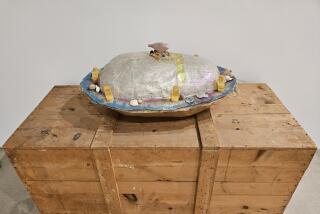In Memory of an Icon: the Smith Corona
- Share via
It probably started with the D in handwriting.
It was 1964. I was in second grade. And Smith Corona--synonymous with typewriter --would become my salvation.
(Note to Miss Roach, my second-grade teacher: Never underestimate the impact of giving an ambitious child who already envisioned herself a writer a D in handwriting. My inner child is still hurt.)
But the typewriter was a balm for that rejection and for many others. As long as the ribbon held up and there was a fresh stack of paper, there was hope. That’s why Wednesday’s news that Smith Corona had gone bankrupt seemed so sad.
The first Smith Corona under our roof was an ancient hand-me-down my mother acquired in her desire to move from homemaker to paycheck-earner. Evenings, after the dinner dishes had been washed, she would pull a chair up to the typewriter stationed in our dining room and practice, the thwack, thwack, thwack filling the air until late at night.
The tedium of learning to type. You remember. The quick XXXX brown fox jumped over XX the lazy dog . XXXXXX#%@*!$#
Nimble-fingered kids growing up on computers today probably won’t ever understand the power of that sentence.
Eventually, Mom graduated from hunt-and-peck to her first secretarial job. And the power of typing as a skill became all the more apparent to me. Not to mention that my handwriting never improved.
Sometime during my high school years, we got a new Smith Corona. It was electric (automatic return!) and had a pop-in correction cartridge for erasing typos. There would be no stopping us now. Mom rose to 65-words-per-minute and I zeroed in on my goal of being a journalist, signing on as a columnist for my high school paper.
Our Smith Corona was the site of much suffering and inspiration.
I hated the precision required to thread a piece of paper through the carriage and have the margin emerge flush. If I got the paper in on the first try, it was a good omen.
And I cursed the typewriter’s weight. I recall heaving the 10-ton Smith Corona from one table to another, my knees buckling and shoulders hunched.
But I also recall yanking out that last sheet of the 40-page term paper with satisfaction and beginning the long, slow search for typos.
In my final year of college, I handed my mother a master letter and a list of about 50 newspapers, and she pounded out cover letters to attach to my resume.
She later told me that she didn’t check for mistakes if the letters were addressed to far-off parts of the country where she didn’t want me to move. Nevertheless, one of the letters hit pay dirt--about 2,000 miles from home.
I lugged my Smith Corona, in its gray plastic case, to my first job in Florida. I used it to write letters home. While at work, I wrote my newspaper stories on a big, graceless IBM typewriter.
A couple of years into my career, computers moved into the newsroom. I don’t recall being a bit sad about it.
And I’m not even certain what happened to my old typewriter. I hadn’t thought about it until, scrolling the news wire at work (on my sophisticated new PC that I can’t figure out how to use), I saw the story about Smith Corona’s collapse.
It seemed so unceremonious. Disrespectful, almost. And I felt a pang of nostalgia.
It was time for reminiscing. One colleague said he actually used his typewriter for addressing envelopes until very recently. But then the computer, the printer, the fax machine and the phone crowded it off his desk.
Others mentioned that they kept their old typewriters and proudly display (but do not use) them. Like trophies, the old machines gather dust and remind us that, in the good old days, we had to get the story right on the first draft. Who had the time to bang out a rewrite?
I think of other colleagues in the various newsrooms where I’ve worked, the old-timers who detested computers and clung to their typewriters.
We laughed at them as we deftly moved paragraphs, split screens and tapped the spell-check key. We thought them silly to resist the new technology. But now it seems kind of admirable.
After all, they were the last to jump ship.
They were defenders of the perfect first-and-only draft.
They were saying, through protest, that there was nothing wrong with the typewriter.
And, you know, they were right.

